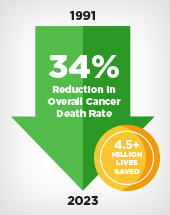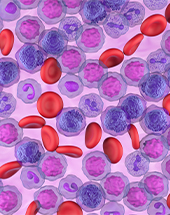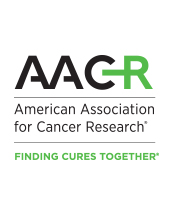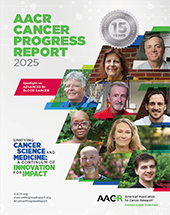Snapshot of a Year in Progress
Between July 1, 2024, And June 30, 2025, FDA approved 20 new anticancer therapeutics and 8 previously approved therapeutics for treating new cancer types.
Home > AACR Cancer Progress Report > AACR Cancer Progress Report 2025: Contents

Between July 1, 2024, And June 30, 2025, FDA approved 20 new anticancer therapeutics and 8 previously approved therapeutics for treating new cancer types.

In the United States (US), the overall cancer death rate has been steadily declining since the 1990s, translating into more than 4.5 million cancer deaths avoided between 1991 and 2023.

Cancer is a collection of diseases in which some of the body’s cells acquire changes that allow them to grow uncontrollably and spread to other parts of the body.

40% of all cancers in the U.S. are associated with modifiable risk factors. The significant decline in cancer mortality over the past 30 years is largely attributable to reductions in smoking through public health campaigns and policy initiatives.

Cancer screening for early detection means checking for cancer in people who are at an average or increased risk of developing cancer but do not have symptoms of the disease. Detecting cancer early through routine screening saves and improves lives and reduces health care costs.

Researchers are leveraging insights into the cellular and molecular mechanisms of cancer initiation and progression to design innovative, patient-centric clinical trials that lead to safer and more effective treatments.

Blood cancers, or hematologic malignancies, make up a large group of cancers that originate from blood-forming tissues. Knowledge gleaned from decades of research is helping inform strategies to intercept and eliminate cells that may progress into blood cancers.

Cancer patients and survivors face a multitude of physical, emotional, and financial challenges. Eating a healthy diet, reducing alcohol and tobacco use, and exercising can improve survivor outcomes.

Next-generation treatments, including cancer vaccines and radiopharmaceutical therapies, could redefine the future of cancer care and offer new hope for difficult-to-treat cancers.

Robust investment in federal agencies, including NCI, is essential to advancing cancer screening, treatment, and survivorship.

To continue the remarkable progress against cancer, the AACR calls on Congress to provide robust, sustained, and predictable annual funding increases for NIH, NCI, FDA, and CDC in FY 2026 and beyond.

Through its programs and services, AACR fosters cancer research; accelerates the dissemination of new research findings; promotes science education and training; and advances the understanding of cancer etiology, prevention, diagnosis, and treatment throughout the world.

The extraordinary progress against cancer to date has been catalyzed by decades of transformative medical research and technological innovation. With sustained commitment and investment, we can dramatically accelerate the pace of progress for the benefit of cancer patients.

We are witnessing tremendous progress against cancer, which is attributable to research discoveries in basic, translational, clinical, and population science as well as technological innovations that are continually improving cancer prevention, detection, diagnosis, and treatment.

Lillian L. Siu, MD, FAACR, serves as the chair of the Steering Committee for the AACR Cancer Progress Report 2025.
Your donation to the American Association for Cancer Research helps our more than 61,000 members worldwide drive progress against cancer.
Donate Today